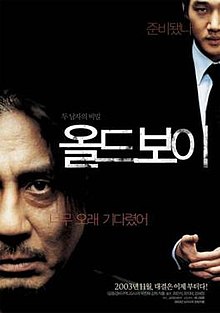 Oldboy
Oldboy
Year: 2003
Rating: R
Length: 120 minutes / 2.00 hours
Some storylines are so timeless; they can’t help to be made into something modern—thus becoming timeless in the process. Oldboy (2003) can easily draw comparisons to The Count of Monte Cristo in its structure but adds depth and layers to a wild ride that unfortunately could not be even closely matched in its American remake in 2013. As it stands, Oldboy is one of the pillars that shows how culturally significant South Korean cinema has been and how its predecessors like Parasite (2019) and Minari (2020) stood on its shoulders to achieve greatness.
Oldboy is a lot like Memento (2000) in that it demands a second viewing, often right after reaching the end credits. Many of the plot’s twists and turns readjust the viewer’s understanding of previous events—to the point where you’ll have to watch it again with this new knowledge fresh in your mind, thus opening up a whole new experience to the film. Revenge is piled upon revenge, but the motivation of these characters is always clear, even if it is uncomfortable at times. Oldboy certainly doesn’t pull its punches when it comes to sex or violence, but don’t let that distract you from the engaging story.
In fact, I would hope that anyone who likes well-done action sequences will take the time to watch this movie. Without spoiling it, I can honestly say there is a moment with a hammer that is as hilarious as it is disturbing. And sure, it might be a bit over-the-top at times, but what action film doesn’t land in this pitfall and still manage to entertain? Either way, by the end of the movie, both the characters and the audience are ultimately changed by what they just learned and saw, respectively.
One of the best South Korean action films ever made, I give Oldboy 5.0 stars out of 5.
This movie is contained in the book, Cinema Connections: a never-ending “6 Degrees of Kevin Bacon” and is connected to The Boondock Saints (1999) and The Housemaid (1960)


